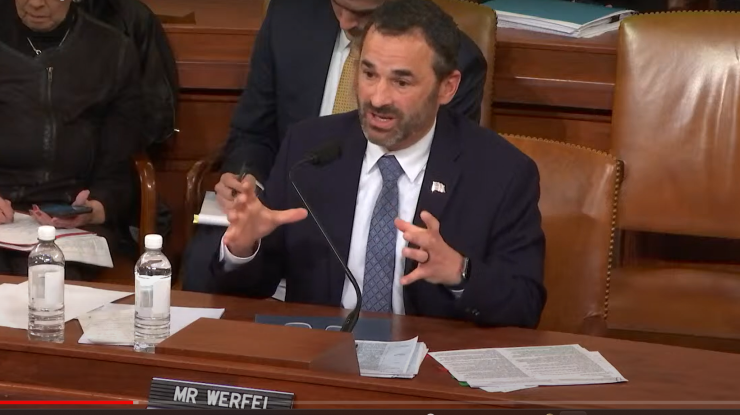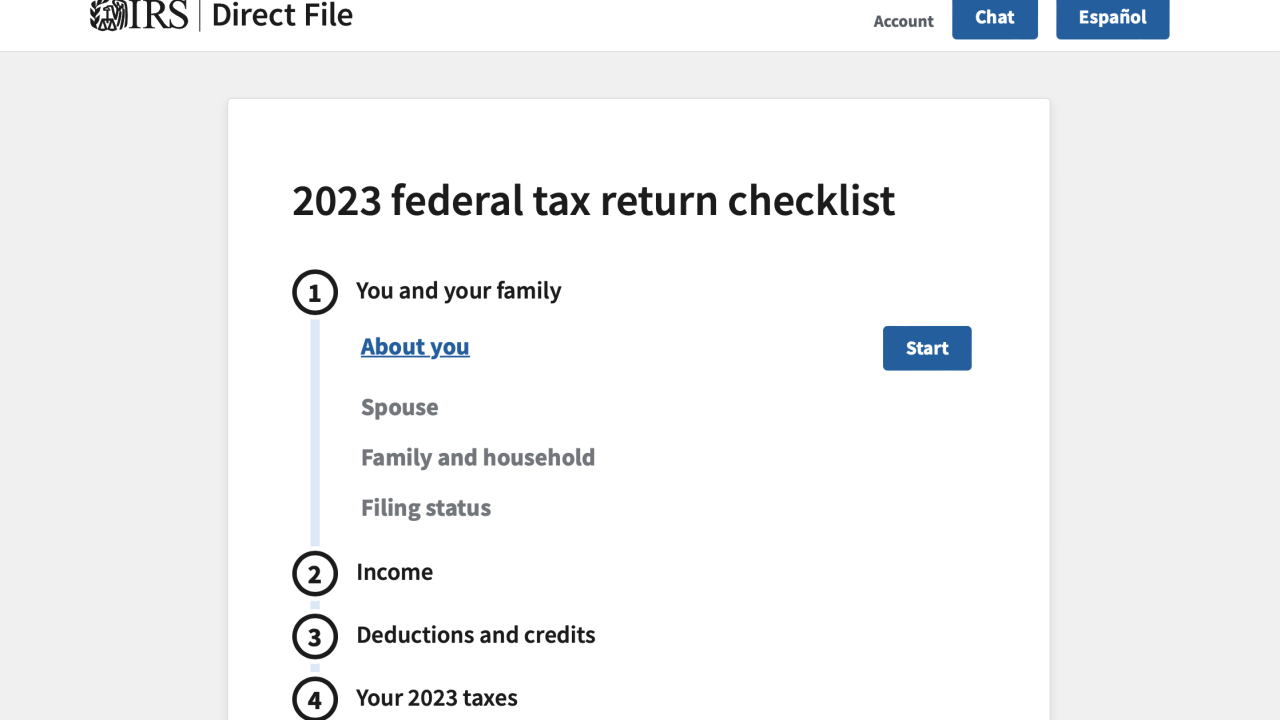The Internal Revenue Service has begun sending notices to high-income taxpayers who haven't been filing tax returns since 2017.
The initiative is starting this week with IRS compliance letters being sent to over 125,000 cases where tax returns haven't been filed. The mailings include over 25,000 to individuals with more than $1 million in income, and over 100,000 to people with incomes between $400,000 and $1 million between tax years 2017 and 2021.
"When people don't file a tax return they're required to, it's not fair to those hardworking taxpayers who responsibly do their civic duty under the laws of our nation," said IRS Commissioner Danny Werfel during a press call Thursday. "When people don't file their taxes, they need to know there's a consequence. And this is why I was particularly troubled to learn when I became commissioner that the IRS had to back off our core compliance work on non-filers. Due to severe budget and staff limitations, the IRS non-filer program has only run sporadically since 2016. This program pullback didn't happen because of lack of information. The IRS knows who these non-filers are. The IRS has the third-party information, such as through Forms W-2 and 1099, indicating these people received significant income but failed to file a tax return. The IRS has known these people are out there, and they involved some very prosperous households."

Using funding received under the Inflation Reduction Act, this week the IRS will start mailing compliance alerts for failure to file a tax return, known as the
People receiving these letters should take immediate action to avoid additional follow-up notices and higher penalties, the IRS warned, in addition to increasingly stronger enforcement measures. People in this category should also consult with a tax professional so they can quickly file their late tax returns and pay delinquent tax, interest and penalties. The
The amount of potential revenue to be gained from the effort is uncertain, as the IRS doesn't know yet the potential credits and deductions the recipients of the notices may have. The third-party information on them indicates economic activity of more than $100 billion. Even with a conservative estimate, the IRS believes hundreds of millions of dollars of unpaid taxes are involved in these cases. However, some non-filers may actually be owed a refund.
Accounting Today asked whether taxpayers would be able to respond to the notices online, as the IRS has expanded the ability to
"Broadly, we have made significant changes to what we call our Document Upload Tool to make sure that people are filing electronically," Werfel responded. "There is the ability when you're filing an updated return to do so electronically, so if your response is to file a return, we really encourage you to use an electronic option. If you have a particularly unique question, it may be that you have to connect with us in a different way. It will depend on the taxpayer's situation. But my main message for folks out there is that when you're refiling or you're filing for the first time and you got this non-filing notice, we really encourage you to look at the electronic option for filing."
Non-filers could face stiff penalties and even be prosecuted if they don't respond to the notices. "Ultimately, this can lead to a variety of IRS compliance activity, including collection and audit actions, as well as potential criminal prosecution," said Werfel.
He noted that the IRS can also take steps to file what is known as a "substitute for return."
"If a person repeatedly fails to respond and does not file a tax return, the IRS may create a substitute tax return for the taxpayer," said Werfel. "The IRS calculates this substitute tax return based on wages and other income reported to the agency by employers, financial institutions and others. The substitute return factors in the tax penalty and interest owed by the taxpayer. This tax return might not give the person credit for the deductions and exemptions they may be entitled to receive. That's because the IRS does not know each taxpayer's situation. If the IRS files a substitute return, it is still in the person's best interest to file their own tax return to take advantage of any exemptions, credits and deductions they are entitled to receive. The IRS will generally adjust the account to reflect the correct figures. The tax return the IRS prepares for these taxpayers will likely lead to a tax bill, which if unpaid will trigger the collection process. This can include such actions as a levy on wages or a bank account, or the filing of a notice of a federal tax lien. If a taxpayer repeatedly does not file, they could be subject to additional enforcement measures, such as additional penalties and/or criminal prosecution."
He pointed out that the new non-filer initiative is part of a larger effort underway at the IRS working to ensure large corporations, large partnerships and high-income individual filers pay the taxes they owe.
"Prior to the Inflation Reduction Act, more than a decade of budget cuts prevented the IRS from keeping pace with the increasingly complicated set of tools that the wealthiest taxpayers use to shelter or manipulate their income to avoid taxes," said Werfel. "The IRS is now taking swift and aggressive action to close this gap. For example, the IRS is continuing to pursue millionaires that have not paid hundreds of millions of dollars in undisputed tax debt. The IRS has collected nearly $500 million in an ongoing effort to recoup taxes owed by 1,600 millionaires, with work continuing in this area."
In other areas, he pointed out, the IRS is pursuing multimillion-dollar partnership balance sheet discrepancies, ramping up its audits of over 75 of the largest partnerships using artificial intelligence as well as other areas. As Congress considers further budget cuts to reduce IRS funding, he defended the IRS's use of the $80 billion it's receiving over a decade under the Inflation Reduction Act of 2022. Lawmakers already reduced that amount by over $20 billion over 10 years as part of a deal last year to raise the debt limit.
"The new non-filer effort focused on high income is part of this larger effort to ensure fairness in the tax system," said Werfel. "The non-filer situation is one of the clearest examples of the need to have a properly funded IRS. With Inflation Reduction Act resources, the agency finally has the funding to pursue this core responsibility and ensure fairness for everyone who plays by the rules. Adequate IRS funding means better service for taxpayers doing the right thing and more compliance for those who aren't following the rules."
Lawmakers are closely watching the IRS's use of the funding. "The most basic responsibility we have as taxpayers is filing a tax return every spring, and it's absolutely outrageous that thousands and thousands of high-income individuals have routinely gotten away with blowing it off," said Senate Finance Committee chairman Ron Wyden, D-Oregon, in a statement. "As somebody who's been sounding the alarm about this issue for years, it's great to hear that the IRS is finally telling the wealthy scofflaws that it's time to get right and pay what they owe."
Separately on Thursday, the Senate Finance Committee held a confirmation hearing Thursday to consider Marjorie Rollinson as IRS chief counsel. She previously served as technical deputy associate chief counsel and then as associate chief counsel, both times on international tax issues.
"Trust me, you don't earn those job titles without real expertise in tax law, down to the finest details that leave most of us scratching our heads," Wyden said in a statement at the hearing. "All this experience is a big reason why she got bipartisan support in the Finance Committee."
The recently updated CP59 notice provides details on what a taxpayer can do to resolve their non-filing status:
- File their signed, personal tax return immediately or explain why a return is not required.
- Complete Form 15103, Form 1040 Return Delinquency, included with the notice to explain:
- Why they're filing late;
- Why they don't have to file; and
- That they've already filed.
- Detach the notice stub and mail it with the tax return and a completed Form 15103 using the envelope provided. They can also fax their information to the fax number in the notice using either a fax machine or an online fax service. The IRS cautioned that taxpayers should protect themselves when sending digital data by understanding the fax service's privacy and security policies.





